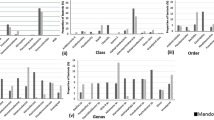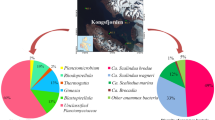Abstract
Five sponge specimens belonging to the genera Spongilla and Ciocalypta were collected from Little Rann of Kutch (in Gujarat, India) and analysed for associated microbiomes. Critical analysis was done with respect to members of the phylum Planctomycetes, using two different strategies; 1. Culture-independent metagenomic approach and 2. culture-dependent anaerobic enrichment for anammox-planctomycetes. The 16S rRNA gene (V1-V3 region) amplicon metagenome analysis revealed significant divergence in bacterial diversity, including Planctomycetes among the sponges analysed. Community metagenomics revealed a total of 376 Operational Taxonomic Units (OTUs) belonging to 41 different phyla. OTUs belonging to Proteobacteria was the most abundant (38%) among the sponge analysed. The KEGG annotation predicted a total of 6909 KEGG orthologs (KOs); most of the KOs are associated with membrane transport, xenobiotic degradation, production of secondary metabolites, amino acid metabolism and carbohydrate metabolism. In the culture-dependent study, FISH analysis confirmed the association of anammox-planctomycetes with sponges. Partial 16S rRNA gene sequences of two planctomycetes (JC545, JC543) were cladding with those of uncultured Phycisphaerae class. The other three putative anammox bacteria (JC541, JC542, JC544) formed a different clade with “Candidatus Brocadia anammoxidans”. These three putative bacteria believably represent new species/genus related to “Candidatus Brocadia”.




Similar content being viewed by others
References
Abdelmohsen UR, Bayer K, Hentschel U (2014) Diversity, abundance and natural products of marine sponge-associated actinomycetes. Nat Prod Rep 31:381–399. https://doi.org/10.1039/c3np70111e
Bayer K, Schmitt S, Hentschel U (2008) Physiology, phylogeny and in situ evidence for bacterial and archaealnitrifiers in the marine sponge Aplysina aerophoba. Environ Microbiol 10:2942–2955. https://doi.org/10.1111/j.1462-2920.2008.01582.x
Ciccarelli FD, Doerks T, von Mering C, Creevey CJ, Snel B, Bork P (2006) Toward automatic reconstruction of a highly resolved tree of life. Science 312:1283–1287. https://doi.org/10.1126/science.1123061
Dedysh SN, Kulichevskaya IS, Beletsky AV, Ivanova AA, Rijpstra WIC, Damste JSS, Ravin NV (2020) Lacipirellula parvula gen. nov., sp. nov., representing a lineage of planctomycetes widespread in low-oxygen habitats, description of the family Lacipirellulaceae fam. nov.and proposal of the orders Pirellulales ord. nov., Gemmatalesordnov.andIsosphaerales ord. nov. SystApplMicrobiol 43:126050. https://doi.org/10.1016/j.syapm.2019.126050
Edgar RC, Haas BJ, Clemente JC, Quince C, Knight R (2011) UCHIME improves sensitivity and speed of chimera detection. Bioinformatics 27:2194–2200. https://doi.org/10.1093/bioinformatics/btr381
Egli K, Fanger U, Alvarez PJJ, Siegrist H, van der Meer JR, Zehnder AJB (2001) Enrichment and characterization of ananammox bacterium from a rotating biological contactor treating ammonium-rich leachate. Arch Microbiol 175:198–207. https://doi.org/10.1007/s002030100255
Felsenstein J (1985) Confidence limits on phylogenies: an approach using the bootstrap. Evolution 39:783–791. https://doi.org/10.1111/j.1558-5646.1985.tb00420.x
Fieseler L, Horn M, Wagner M, Hentschel U (2004) Discovery of the novel candidate phylum “Poribacteria” in marine sponges. Appl Environ Microbiol 70:3724–3732. https://doi.org/10.1128/AEM.70.6.3724-3732.2004
Gernert C, Glockner FO, Krohne G, Hentschel U (2005) Microbial diversity of the freshwater sponge Spongillalacustris. MicrobEcol 50:206–212. https://doi.org/10.1007/s00248-004-0172-x
Hammer O, Harper D, Ryan PD (2001) PAST: paleontological statistics software package for education and data analysis. Palaeontologia Electronica 1:9. http://palaeo-electronica.org/2001_1/past/issue1_01.htm
Hentschel U, Fieseler L, Wehrl M, Gernert C, Steinert M, Hacker J et al (2003) Microbial diversity of marine sponges. ProgMolSubcellBiol 37:59–88. https://doi.org/10.1007/978-3-642-55519-0_3
Hentschel U, Piel J, Degnan SM, Taylor MW (2012) Genomic insights into the marine sponge microbiome. Nat Rev Microbiol 10:641–654. https://doi.org/10.1038/nrmicro2839
Hoffmann F, Rapp HT, Reitner J (2006) Monitoring microbial community composition by fluorescence in situ hybridization during cultivation of the marine cold-water sponge Geodia barretti. Mar Biotechnol 8:373–379. https://doi.org/10.1007/s10126-006-5152-3
Hoffmann F, Radax R, Woebken D, Holtappels M, Lavik G, Rapp HT et al (2009) Complex nitrogen cycling in the sponge Geodia barretti. Environ Microbiol 11:2228–2243. https://doi.org/10.1111/j.1462-2920.2009.01944.x
Imhoff JF, Stohr R (2003) Sponge-associated bacteria: general overview and special aspects of bacteria associated with Halichondria panicea. ProgMolSubcellBiol 37:35–57. https://doi.org/10.1007/978-3-642-55519-0_2
Kartal B, de Almeida NM, Maalcke WJ et al (2013) How to make a living from anaerobic ammonium oxidation. FEMS Microbiol Rev 37:428–461. https://doi.org/10.1111/1574-6976.12014
Kozich JJ, Westcott SL, Baxter NT, Highlander SK, Schloss PD (2013) Development of a dual-index sequencing strategy and curation pipeline for analyzing amplicon sequence data on the MiSeqIllumina sequencing platform. Appl Environ Microbiol 17:5112–5120. https://doi.org/10.1128/AEM.01043-13
Kumar S, Stecher G, Tamura K (2016) Molecular evolutionary genetics analysis version 7.0 for bigger datasets. MolBiolEvol 33:1870–1874. https://doi.org/10.1093/molbev/msw054
Lafi FF, Fuerst JA, Fieseler L, Engels C, Goh WWL, Hentschel U (2009) Widespread distribution of Poribacteria in Demospongiae. Appl Environ Microbiol 75:5695–5699. https://doi.org/10.1128/AEM.00035-09
Langille M, Zaneveld J, Caporaso JG, McDonald D, Knights D, Reyes J et al (2013) Predictive functional profiling of microbial communities using 16S rRNA marker gene sequences. Nat Biotechnol 31:814–821. https://doi.org/10.1038/nbt.2676
Mohamed NM, Saito K, Tal Y, Hill RT (2010) Diversity of aerobic and anaerobic ammonia-oxidizing bacteria in marine sponges. ISME J 4:38–48. https://doi.org/10.1038/ismej.2009.84
Parsley LC, Newman MM, Liles MR (2010) Fluorescence in situ hybridization of bacterial cell suspensions. Cold Spring HarbProtoc 9:pdb.prot5493. https://doi.org/10.1101/pdb.prot5493
Patel R, Mevada V, Prajapati D, Dudhagara P, Koringa P, Joshi CG (2015) Metagenomic sequence of saline desert microbiota from wild ass sanctuary, Little Rann of Kutch, Gujarat, India. Genom Data 15:137–139. https://doi.org/10.1016/j.gdata.2015.01.003
Perez T, Sarrazin L, Rebouillon P, Vacelet J (2002) First evidences of surfactant biodegradation by marine sponges (Porifera): an experimental study with a linear alkylbenzenesulfonate. Hydrobiologia 489:225–233. https://doi.org/10.1023/A:1023217218585
Pruesse E, Quast C, Knittel K, Fuchs BM, Ludwig WG, Peplies J, Glöckner FO (2007) SILVA: a comprehensive online resource for quality checked and aligned ribosomal RNA sequence data compatible with ARB. Nucl Acids Res 35:7188–7196. https://doi.org/10.1093/nar/gkm864
Qiong W, George MG, James MT, James RC (2007) Naive Bayesian classifier for rapid assignment of rRNA sequences into the new bacterial taxonomy. Appl Environ Microbiol 73:5261–5267. https://doi.org/10.1128/AEM.00062-07
Schleifer K (2004) Microbial diversity: facts, problems and prospects. SystApplMicrobiol 27:3–9. https://doi.org/10.1078/0723-2020-00245
Schloss PD (2009) A high-throughput DNA sequence aligner for microbial ecology studies. PLoS ONE 4:e8230. https://doi.org/10.1371/journal.pone.0008230
Schmid MC, Maas B, Dapena A, Van de Pas-Schoonen K, Van de Vossenberg J, Kartal B, van Niftrik L, Schmidt I, Cirpus I et al (2005) Biomarkers for in situ detection of anaerobic ammonium-oxidizing (Anammox) bacteria. Appl Environ Microbiol 4:1677–1684. https://doi.org/10.1128/AEM.71.4.1677-1684.2005
Schmitt S, Tsai P, Bell J, Fromont J, Ilan M, Lindquist N, Perez T, Rodrigo A, Schupp PJ et al (2012) Assessing the complex sponge microbiota: core, variable and species-specific bacterial communities in marine sponges. ISME J 3:564–576. https://doi.org/10.1038/ismej.2011.116
Sipkema D, Holmes B, Nichols SA, Blanch HW (2009) Biological characterisation of Haliclona (gellius) sp.: sponge and associated microorganisms. MicrobEcol 58:903–920. https://doi.org/10.1007/s00248-009-9534-8
Steinert G, Wemheuer B, Janussen D, Erpenbeck D, Daniel R, Simon M, Brinkhoff T, Schupp PJ (2019) Prokaryotic diversity and community patterns in Antarctic continental shelf sponges. Front Mar Sci 6:297. https://doi.org/10.3389/fmars.2019.00297
Strous M, Pelletier E, Mangenot S, Rattei T, Lehner A, Taylor MW, Horn M, Daims H, BartolMavel D, Wincker P (2006) Deciphering the evolution and metabolism of an anammox bacterium from a community genome. Nature 440:790–794. https://doi.org/10.1038/nature04647
Tamura K (1992) Estimation of the number of nucleotide substitutions when there are strong transition-transversion and G+C content. MolBiolEvol 9:678–687. https://doi.org/10.1093/oxfordjournals.molbev.a040752
Taylor MW, Radax R, Steger D, Wagner M (2007) Sponge-associated microorganisms: evolution, ecology, and biotechnological potential. MicrobiolMolBiol Rev 71:295–347. https://doi.org/10.1128/MMBR.00040-06
Thomas T, Moitinho-Silva L, Lurgi M, Björk JR, Easson C, Astudillo-García C, Olson JB, Erwin PM, López-Legentil S, Luter H, Chaves-Fonnegra A (2016) Diversity, structure and convergent evolution of the global sponge microbiome. Nat Commun 7:1–2. https://doi.org/10.1038/ncomms11870
Van de Graaf AA, de Bruijn P, Robertson LA, Jetten MSM, Kuenen JG (1996) Autotrophic growth of anaerobic ammonium-oxidizing micro-organisms in a fluidized bed reactor. Microbiol 142:2187–2196. https://doi.org/10.1099/13500872-142-8-2187
Van de Graaf AA, de Bruijn P, Robertson LA, Jetten MSM, Kuenen JG (1997) Metabolic pathway of anaerobic ammonium oxidation on the basis of 15N studies in a fluidized bed reactor. Microbiol 143:2415–2421. https://doi.org/10.1099/00221287-143-7-2415
Webster NS, Cobb RE, Negri AP (2008) Temperature thresholds for bacterial symbiosis with a sponge. ISME J 2:830–842. https://doi.org/10.1038/ismej.2008.42
Weisz JB, Hentschel U, Lindquist N, Martens CS (2007) Linking abundance and diversity of sponge-associated microbial communities to metabolic differences in host sponges. Mar Biol 152:475–483. https://doi.org/10.1007/s00227-007-0708-y
Wiegand S, Jogler M, Jogler C (2018) On the maverick Planctomycetes. FEMS Microbiol Rev 42:739–760. https://doi.org/10.1093/femsre/fuy029
Wiegand S, Jogler M, Boedeker C, Pinto D, Vollmers J, Rivas-Marín E et al (2020) Cultivation and functional characterization of 79 Planctomycetes uncovers their unique biology. Nat Microbiol 5:126–140. https://doi.org/10.1038/s41564-019-0588-1
Wilkinson CR (1979) Nutrient translocation from symbiotic cyanobacteria to coral reef sponges. In: Levi C, Boury-Esnault N (eds) Biologie des Spongiaires. C.N.R.S p, Paris, pp 373–380
Acknowledgements
Chintalapati Venkata Ramana thanks to the Department of Biotechnology and CSIR Government of India for the award of Tata Innovative Fellowship and financial assistance, respectively. Vaddavalli Radha thanks to University Grants Commission for the award of Women-Post Doctoral Fellowship. Gaurav Kumar thanks to Department of Biotechnology (DBT) for providing financial assistance in the form of fellowship, and Uppadda Jagadeeshwari thanks Technical Education Quality Improvement Program (TEQIP) of World Bank, given to IST, JNTU Hyderabad. Ministry of Earth Sciences (MoES) and TEQIP are acknowledged for providing financial assistance to JNT University Hyderabad. DST and UGC are acknowledged for providing infrastructural facilities under FIST and SAP-DRS programs to Department of Plant Sciences, University of Hyderabad.
Author information
Authors and Affiliations
Corresponding author
Ethics declarations
Conflict of interest
Authors express no conflict of interest.
Electronic supplementary material
Below is the link to the electronic supplementary material.
Rights and permissions
About this article
Cite this article
Kumar, G., Radha, V., Jagadeeshwari, U. et al. Bacterial communities of sponges from the wetland ecosystem of Little Rann of Kutch, India with particular reference to Planctomycetes. 3 Biotech 10, 478 (2020). https://doi.org/10.1007/s13205-020-02449-1
Received:
Accepted:
Published:
DOI: https://doi.org/10.1007/s13205-020-02449-1




